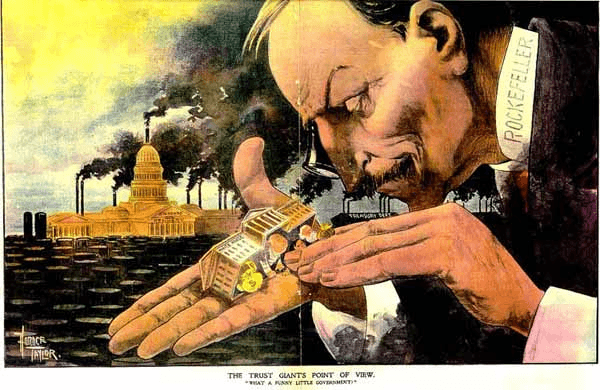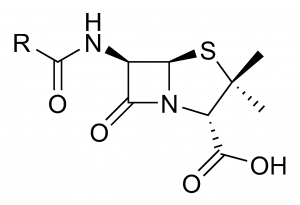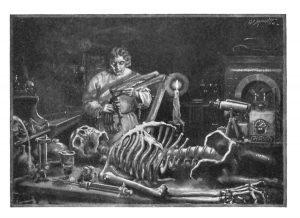The name Rockefeller is synonymous with monuments and centers in such cities as New York and Cleveland.1 It is also the name that is associated with one of the richest families in America and one of the richest men ever to have lived. However, John D. Rockefeller was also one of the most vilified men of his era due to how he came upon his wealth. Whether it was through inauspicious practices or law evasion, Rockefeller became one of the most disliked Robber Barons of his time. His tussles with the media, and specifically with Ida Tarbell, also aided in this negative perception. That perception began to change as time went on, as he became a major philanthropist in the early 1900s. This charitable work in his later years helped improve his public image as time went on and even after his death in 1937.

The public’s perception of Rockefeller during the mid to late 1800s was that he was a Robber Baron as well as a morally compromised man. Ida Tarbell was one of the leading muckrakers of the Progressive Era, who dedicated herself to uncovering the truth about Rockefeller. She helped in exposing a side of John Rockefeller’s identity, which was that of a shrewd businessman who would often seek advantages through unfair means. In addition, she stated that Rockefeller’s philanthropy was tainted due to the immoral means he employed in his acquisition of wealth.2 Although some of Ida Tarbell’s criticisms of Rockefeller came out of spite as well as fact, there was no denying the influence she had in creating the public’s perception of Rockefeller. One result of her exposé was the U.S. Supreme Court’s decision to use the Sherman Antitrust Act to break up Rockefeller’s Standard Oil Company.3 Thus, one of the richest and most powerful companies in the world was severely crippled.
John Rockefeller’s identity had been tainted, and his company had been broken. Rockefeller was still very wealthy, but he did not necessarily know what to do with all his wealth. Thus, he became involved in his community as a philanthropist. Rockefeller devoted a portion of his money to charity, and he established a variety of institutions to help others. Rockefeller helped establish the University of Chicago and placed William Rainey Harper, someone he trusted, to lead the University. Additionally, Rockefeller always made it a point to give whenever he could to the University.4
Therefore, there is a contradiction when it comes to Rockefeller. How could such a Robber Baron be so generous when his life’s work had been to acquire as much wealth as possible? In addition, Rockefeller was also portrayed as a man who loved his children and taught them the value of money, while going to church regularly.5 But the John Rockefeller that was described by Ida Tarbell was of a man with a dual personality.6 In conclusion, many will call Rockefeller a Robber Baron for the underhanded tactics he employed, and who therefore cannot be absolved of these activities. Some will say that his philanthropic works, charity to churches, and personal character more than overshadow his past transgressions. What can be for certain is that the debate over whether John Davison Rockefeller Sr. should be viewed as a friend or fiend will continue for years to come.
- Salem Press Encyclopedia, January 2016, s.v. “ Rockefeller Center ,” by John A. Flink. ↵
- Steve Weinberg, Taking on the Trust (New York: W.W. Norton, 2008), 234-235. ↵
- Ron Chernow, Titan: the life of John D. Rockefeller, Sr. (New York: Random House, 1998), 534. ↵
- Allan Nevins, John D. Rockefeller: The Heroic Age of American Enterprise (New York: Scribner’s Sons, 1941), 234-243. ↵
- Ron Chernow, Titan: the life of John D. Rockefeller, Sr. (New York: Random House, 1998), 187–91. ↵
- Steve Weinberg, Taking on the Trust (New York: W.W. Norton, 2008), 237. ↵



63 comments
Amanda Figueroa
The picture is what captured my eye and what got me to read this, so it was very good choice. When learning about John Rockefeller in U.S. history, I was under a negative impression of him and never learned how became involved with the community and gave money to charity. This article was very informative and gave me more insight to Rockerfeller’s life.
Michelle Falcon
This article is about one of the most iconic names in history regarding the industrial age, this name being John D. Rockefeller. It tells the true colors of Rockefeller, he was seen as one of the most disliked men because of his business decisions. However it goes on to tell how many did now him as a loving, caring and religious man, who took care of his kids. In the end how we choose to see Rockefeller is of our own personal opinions. Over all this was a great article.
Ryann Cervantes
Great article, I always feel Rockefeller and his family are not talked about enough in the past or nowadays. While it may be seen as a way to only improve hispublic image (like a company partaking in charity), you can’t deny that even after he had made enough money, he still decided to help his community. That can say a lot about how he changed and a second chance is what he needed.
Gabriela Serrato
It is hard to say whether Rockefeller was indeed “friend” or “fiend.” Can one forget his ugly past and solely focus on the man he eventually became? I guess that depends on the individual and who is judging. I honestly do find it rather nice that Rockefeller turned to provide charity and help out in other cases. But when someone’s reputation is on the line, it is hard to determine if his actions in doing this were in order to give some good to his name or if he truly had changed. What I do know that is true is that Rockefeller at least attempted to do some good. While other’s who have wealth and riches simply do not care what the public thinks of them and will continue being terrible people all together.
Edward Cerna
This was an interesting article to read and I enjoyed it very much. I did not know much about Rockefeller except that the family is one of the richest in the world. I believe he donated so much money and help set up institutions to help others as he got older to maybe make up for the things he maybe did in his past.
Maria Callejas
Not so long ago I saw “The Men Who Built America”, so my view of Rockefeller was one of admiration, for his contribution as a magnate and philanthropist in the early industrial America. However, that view changed throughout this text, caused in part by the play of words in the article’s title, but mostly for the use of factual evidence. For example, citing Ida Tarbell’s efforts for the dismantling of Rockefeller’s deviant business practices perfectly portrays the dark reality of his corporation. Furthermore, I have to agree with your conclusion, we will never be sure if he was a wrongful hero or a kind-hearted villain.
Nahim Rancharan
I liked reading this article! It provided an interesting take on John D. Rockefeller. What initially drew me to this article was the cover image, which only enforced the more popular view of one of the most important and wealthiest men in American History. Yes his action weren’t the most considerate, but the truth of the matter is that those times were a time of growth and competition, where only the most clever and determined minds could thrive in that age of American capitalism. For this reason, I thought that the title was very well suited, because it gave readers the opportunity to make their own conclusions about Rockefeller and the article guided the readers well. Great Article overall!
Nelson Smithwick
It is hard to say if Rockefeller was actually as bad as he is remembered for being. He was said to be quite viscous in dealings and amoral when it came to acquiring his riches, however he’s also known for his philanthropic efforts, donating many thousands of dollars to colleges and other places of higher education, I guess it will always be up for debate.
Zaraly Frasquillo
Your featured image is GOLD! I see why you were nominated for the image award! Okay, so i really like your article mainly because you helped me understand who and what Rockefeller really was. ALthough he was a philanthropist, after reading your article I am starting to realize that he was just doing good deeds because he wanted to erase his bad image, and you shunned a light to that. Overall job, you should really be proud because this article was great!
Erick Martinez
Hey Oscar, this was a great article. The information given to the reader throughout truly allows the reader to make a decision on whether John Rockefeller was a friend or a fiend. I am a firm believer in second chances, and although her earned a great deal of his fortune illegitimately, in the end he changed his ways. Even if you view Rockefeller as a fiend, despite his change of heart, he will still be remembered.